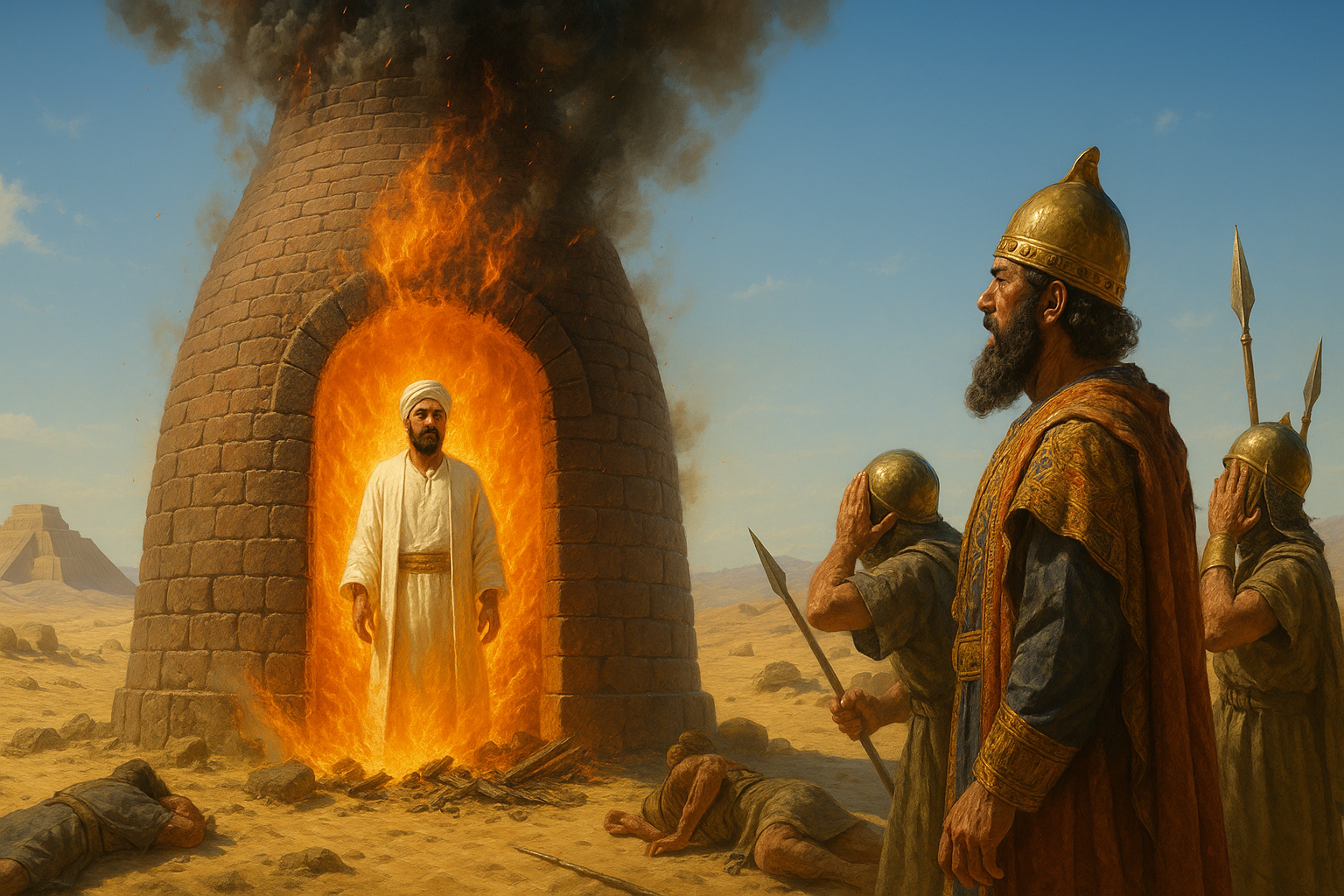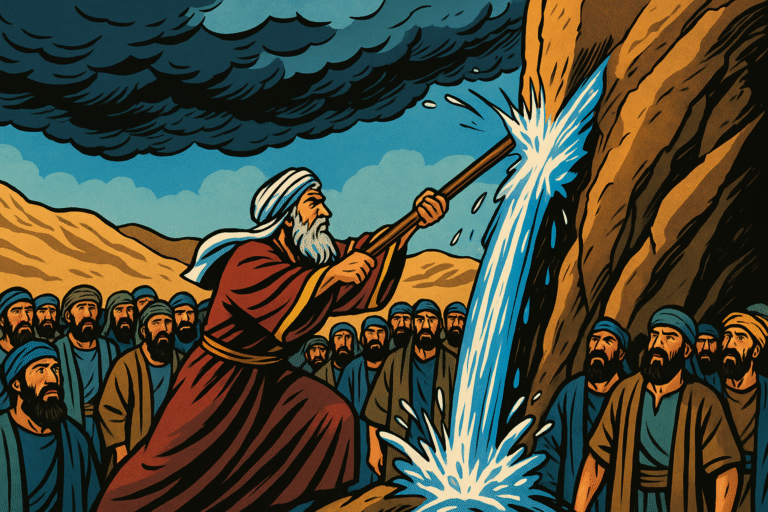The Level of Not Caring

What Ultimate Bitachon Looks Like
When the Torah introduces us to Avraham and his father Terach, we are told something rather enigmatic (Bereshit 11:28): וַיָּמׇת הָרָן עַל־פְּנֵי תֶּרַח אָבִיו בְּאֶרֶץ מוֹלַדְתּוֹ בְּאוּר כַּשְׂדִּים (And Haran died before Terach his father in the land of his birth, in Ur Kasdim). Now the p'shat is that Haran, Avraham's brother, died in the same city in which he was born, namely, Ur Kasdim. However, on the Midrashic level, there is much more here that the Torah is revealing to us. Let's unpack it.
Rashi tells us that when the Torah says that Haran died עַל־פְּנֵי תֶּרַח (before Terach) it means that he died בְּחַיֵי אָבִיו (in his father's lifetime). That's the p'shat. But then Rashi dives deep. It's not just that he died in his father's lifetime, but that he died עַל יְדֵי אָבִיו (on account of his father). It's brought down in Bereshit Rabbah 38:13 that Terach had taken Avraham and handed him over to Nimrod for 'justice' because he had smashed the idols in his store. Rashi summarizes what happened: וְהִשְׁלִיכוֹ לְכִבְשַׁן הָאֵשׁ וְהָרָן יוֹשֵׁב וְאוֹמֵר בְּלִבּוֹ אִם אַבְרָם נוֹצֵחַ אֲנִי מִשֶּׁלּוֹ וְאִם נִמְרוֹד נוֹצֵחַ אֲנִי מִשֶּׁלּוֹ (And they threw him into the fiery furnace, and Haran sat and said to himself, If Avram is victorious I'll be with him, but if Nimrod is victorious, I'll be with him). The Midrash describes Haran's approach with these words: הֲוָה תַּמָן הָרָן קָאֵים פְּלוּג (Haran was there, standing and arguing). He wasn't arguing – or debating – with someone else. Rather, he was conflicted. He was debating within himself how he would answer Nimrod after the execution of Avraham's sentence.
When Haran saw that Avraham was victorious – that a miracle had been done for him, saving him from death in the midst of the fire – all eyes turned toward him, and in an act of public defiance against Nimrod's regime, he said, 'I'm with Avraham!' From Nimrod's point of view, these words were not only heretical but treasonous. Haran was immediately arrested and thrown into the fire where he was burned to death. Rashi then states that this is the deeper meaning of the name Ur Kasdim, i.e. the fire of Kasdim – not the name of the city where he was born, but a hidden reference to the fiery furnace itself, the manner in which he died.
So how come a miracle was performed for one brother but not for the other? This is a deep question, and one which cannot be simply answered, but if we focus on the spiritual quality known as bitachon, then we can, at least, suggest a reason.
Avraham's test was not about courage or martyrdom – not at all. It was about bitachon – trusting in Hashem. And bitachon in its highest form is total surrender to Hashem's will. It is not the belief that Hashem will surely save us, but the calm acceptance that whatever Hashem does must be for our good. Bitachon is the outward journey of a life that emerges from emunah. We can express it in the negative – which in some respects may be easier to understand – bitachon is not hoping for or caring about a particular outcome. When we care or hope for a particular outcome, that means that we haven't fully given over control of our lives to Hashem. It means that we don't fully trust Hashem – not 100% – and it means that we are still attached to our own will. In short, when we desire a particular outcome, it means that we still want to be in charge – that we haven't given up our will – and that we really don't believe, i.e., have the emunah, that Hashem's decision in orchestrating the outcome for us will truly be the best. But Avraham had reached that level.
Perhaps the best expression of that level comes from the mouth of Daniel's three friends, when faced with a very similar situation. Nevuchadnetzer had erected a massive image of gold and commanded that when people heard the music playing, they were required to bow down and worship the image, and that anyone who refused would be immediately thrown into a fiery furnace (Daniel 3:1-6). Chananiah, Mishael and Azariah refused and were brought before the king. When the king asked them whether the accusations brought against them were true, they responded (Daniel 3:17-18): הֵן אִיתַי אֱלָקַנָא דִּי־אֲנַחְנָא פָלְחִין יָכִל לְשֵׁיזָבוּתַנָא מִן־אַתּוּן נוּרָא יָקִדְתָּא וּמִן־יְדָךְ מַלְכָּא יְשֵׁיזִב׃ וְהֵן לָא יְדִיעַ לֶהֱוֵא־לָךְ מַלְכָּא דִּי לֵאלָהָךְ לָא־אִיתַנָא פָלְחִין וּלְצֶלֶם דַּהֲבָא דִּי הֲקֵימְתָּ לָא נִסְגֻּד (Behold, our G-d whom we serve is able to deliver us from the blazing fiery furnace, and from your hand, O king, He will deliver us. And if not, let it be known to you, O king, that we do not serve your god and we will not bow down to the golden image that you set up). Their bitachon wasn't based on expecting a specific result. They trusted entirely in Hashem's will, not in their own survival. Their words reflected the deepest level of bitachon: trusting that whatever Hashem chooses – rescue or death – is the best choice, and remaining loyal to Him is what really matters.
On the other hand, Haran's conditional statement exposed his divided heart. He was concerned about the outcome; and therefore, he waited to see who would emerge victorious before deciding his allegiance. Hoping for a particular outcome is not bitachon in its absolute essence. But don't misunderstand. Haran acted very bravely, with tremendous courage – which itself is a very high level – but it wasn't total surrender to Hashem's will.
So whereas Avraham didn't care about the outcome, Haran did care. And that's the difference between complete bitachon and a deficient bitachon.
Now we can answer the question we asked earlier. How come a miracle was performed for Avraham but not for Haran? First of all, the miracle that Hashem performed for Avraham was not a reward for bitachon, but the natural consequence of it. When someone's trust is whole, rooted in pure, simple emunah, that person is no longer bound by the 'laws of nature.' He rises to a level of 'above nature,' and instead of being subject to nature, nature becomes subject to the will of the One he serves. But Haran, still divided between fear and hope, remained subject to nature. His partial faith – although commendable in its own right – could not suspend the laws of nature, because he was still bound within its system.
This is fully reflected in the Yefeh To'ar on Bereshit Rabbah 38:13. Explaining why no miracle was performed for Haran, he writes: ומה דלא נעשה נס להרן ג"כ משום שאין עושין נס אלא למי שמוסר נפשו על מנת שלא יעשה לו נס. והרן חפץ דוקא בנס (And the reason no miracle was done for Haran also is because a miracle is only done for one who gives up his life on condition that no miracle be done for him, but Haran specifically desired a miracle). This sentiment is in full agreement with Rashi on Vayikra 22:32: וּכְשֶׁהוּא מוֹסֵר עַצְמוֹ יִמְסֹר עַצְמוֹ עַל מְנָת לָמוּת שֶׁכָּל הַמּוֹסֵר עַצְמוֹ עַל מְנָת הַנֵּס אֵין עוֹשִֹׁין לוֹ נֵס (And when he gives himself over, he must give himself over on condition to die, for anyone who gives himself over on condition of a miracle, they don't do a miracle for him).
So how did Avraham develop this amazing bitachon? To answer that question, we arrive at a rather obscure set of teachings in the Gemara (Bava Batra 91a): ואמר רב חנן בר רבא אמר רב: עשר שנים נחבש אברהם אבינו – שלש בכותא, ושבע בקרדו. ורב דימי מנהרדעא מתני איפכא. אמר רב חסדא: עיברא זעירא דכותא זהו אור כשדים (Rav Chanan bar Rava said in the name of Rav: Avraham Avinu was imprisoned for ten years – three in Kuta and seven in Kardu. And Rav Dimi from Nehardea taught it the other way around. And Rav Chisda said, Little Ivra of Kuta is Ur Kasdim). There are different opinions as to when, precisely, this ten-year imprisonment took place, but let's learn it according to R' Eliezer.
R' Eliezer lists Avraham's imprisonment as the second of his ten trials (Pirkei d'R' Eliezer 26:6): וּלְאַחַר עֶשֶׂר שָׁנִים שָׁלְחוּ וְהֵבִיאוּ אוֹתוֹ אֶצְלוֹ וְהִשְׁלִיכוּהוּ לְתוֹךְ כִּבְשַׁן הָאֵשׁ (And after ten years, they sent and brought him before him [i.e. Nimrod], and they threw him into the fiery furnace). The chronology is that after breaking his father's idols, Avraham was imprisoned for ten years before being cast into the fire. This Midrash clarifies Chazal's enigmatic account of his imprisonment: Rav Dimi said it should be taught ipcha –the other way around – meaning that the order of the two imprisonments, in Kuta and Kardu, should be reversed. According to the Radal, Kuta must have been the second and longer term, since from there he was taken to the furnace – as Rav Chisda explained, 'Little Ivra of Kuta' (an oblique reference to the young Avraham) corresponds to Ur Kasdim. Thus the first three years, in Kardu, corresponded to the purification of his mochin – chochmah, binah, and da'at – and the final seven to the refinement of his seven middot: chesed, gevurah, tiferet, netzach, hod, yesod, and malchut.
That's how Avraham developed his amazing bitachon – not only by enduring those ten years of imprisonment but by transforming their darkness into the foundation of his unwavering bitachon in Hashem. And for this reason, Yosef 'needed' to spend two extra years in prison above and beyond the original ten years – davka because he hadn't yet been purified of caring about the outcome, as it is written (Tehillim 105:19): עַד־עֵת בֹּא־דְבָרוֹ אִמְרַת יְיָ צְרָפָתְהוּ (Until the time that his word came [to pass], the word of Hashem refined him).
Now that we've caught a glimpse of what bitachon looks like in its highest form, we should not allow ourselves to feel discouraged when we see how far we still have to go. The goal is not to compare ourselves with others, but to walk in the direction of the light: to speak with Hashem honestly every day in hitbodedut, to work on bitul, and to trust Him a little more today than we did yesterday. Every moment of every day is a new chance to strengthen the quiet bond of bitachon that Avraham developed.







Would you say that Avraham didn't always maintain this level throughout his entire story? If so, what lesson can be learned from his ascent, descent, and ascent?
Good questions. First of all, Avraham's wasn't born with this level of bitachon. That's clear. And it's also clear that the ten years of incarceration was the real refining furnace which propelled him to that level — along with calling out to H' in daily hitbodedut since the time he was young. All this is understood plainly from the story in the Chumash and Midrash and other main sources. So, although I'm sure which ascents and descents you're specifically referring to here, he point is relevant to all of us. R' Nachman teaches this over and over again. We all need to ascend and descend. This is referred to as 'ratzo v'shov' — also called 'entering and exiting.' This is the rhythm of life. We ascend in order to acquire the spiritual tools that we need to descend, and we descend with these tools to raise up the holy sparks that fell to these low levels — much like a pearl diver Then we elevate those sparks and repeat the process. If we descend purposefully (i.e. without sinning), then the descend serves a very high purpose. When we descend through sin (chas v'shalom), then only when we do teshuvah b'ahavah does the descend become transformed into a merit.
To learn more:
https://www.theshoemakerreport.com/index.php/2022/05/20/good-good-goodgood-vibrations/
https://www.theshoemakerreport.com/index.php/2022/10/28/the-source-of-novel-torah-insights/
Thank you for the reply. I was referring to Egypt with Sarah specifically, and with Avimelech, but also perhaps the ordeal of Yishmael being descents and the akedah being the ascent.
How does one descend if not through sin or not living up to his level? How do you define a tzaddik falling 7 times and getting up in context of this?